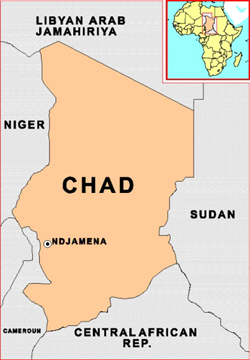Chad's president casts ballot in reelection
Chadian voters began casting ballots in a presidential election Wednesday that offered no real alternatives to incumbent Idriss Deby, who rebuffed calls to delay the vote in order to hold talks with rebels who attacked his capital less than a month ago. Only a handful of voters were seen around polling stations shortly after they opened and most businesses in the capital were closed for the day.

There was little question that Deby would retain power after the opposition boycotted the polls and the only other names on the ballot were Deby's cronies. Deby himself was among the first to place his vote into a clear plastic ballot box. "All Chadians have come out to make their choice, the choice of their hearts, the choice of their convictions," Deby said. "This is enough proof that the people of Chad are mature, that they don't need anybody to tell them to boycott elections."
Rebels based on the country's chaotic border with the Darfur region of Sudan had pledged to prevent the election from taking place. The rebels launched a pre-dawn attack on the capital of one of the world's poorest countries last month in a failed bid to oust Deby. Deby needs massive turnout to give his re-election legitimacy. The field includes three of Deby's allies and a minor opposition leader.
"All we want is peace, that everything goes on without incident," said Celestine Maimouna, a trader in the capital, N'Djamena, who declined to say whether she will vote. "With peace, we can go on with our business." Deby, who seized power in 1990, won votes in 1996 and 2001 that critics say were neither free nor fair. Last year, he pushed for a national referendum to change the constitution to allow him to run for a third term. The amendment passed after an opposition boycott.
Darfur where Sudan 's government is accused of backing Arab tribal militias known as Janjaweed that murder and rape civilians and lay waste to villages has been a staging ground for Chadian rebels. Sudan accuses Chad of supporting the Darfur rebels. Eastern Chad is home to some 200,000 refugees from Darfur and violence from the conflict in Sudan has been spilling over the border.
Chad began pumping petrol from an oil field in the country's south in 2003. But oil has not meant instant riches, and has been another source of tension. Deby's rivals, who are hoping for a low voter turnout, said the country needs electoral reform before credible polls can be held. Deby countered that a delay would create a constitutional vacuum.
About 5.8 million people in this country of almost 10 million are registered to cast ballots at some 11,800 polling stations. Saleh Djibril Bashir, a trader who was seated outside a campaign office of Deby's Patriotic Salvation Movement, said he was going to vote for the president because he "built the roads here, the bridge, he began exporting petrol."
Dionmaye Mbaimoundou, an unemployed university graduate, said he was not going to vote because he believes the register of voters had been tampered with and the country's electoral commission was not independent. "Chadians who care about our future and our country, we cannot accept such wrong things," Mbaimoundou said. "To show that we are not with him (the president), we will not vote."
Deby defended his 16-year tenure Sunday, saying Chad had made economic and social strides and he had allowed democracy to take root in the country. He also railed against Sudan , something he has done since rebels who have been fighting in eastern Chad attacked N'djamena, about 620 (1,000 kilometers) from their bases, on April 13. Deby, who himself came to power with Sudan 's help, says the rebels are mercenaries hired by Sudan to destabilize the central Africa region, a charge Sudan denies. But some of the leading Chadian insurgents are members of Deby's family, reports the AP.
N.U.
Subscribe to Pravda.Ru Telegram channel, Facebook, RSS!


